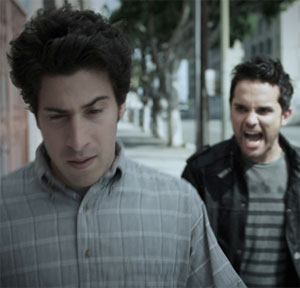With Snap, directors Youssef Delara and Victor Teran‘s key goal seems to be thrusting their audience into uncomfortable situations. Mental health is an extremely hot topic on the national stage and here we have a film that plays with the idea that someone with issues can be a bit unstable. How do you deal with that? If they aren’t violent, is there a way to corral them? There’s also the exploration of boundaries between humans, and how getting close physically can have a long-term effect.
Jim (Jake Hoffman) is a dubstep prodigy that has no desire to become commercialized. He’s very popular, but isn’t making money from his success. He creates music to escape his past, drowning it out. When he visits a friend to help with some IT work he runs across Wendy (Nikki Reed). She is a kind-hearted young social worker who is familiar with Jim’s music and takes an interest in him. She brings out the best in him, encouraging him to share his great music and become less socially awkward. Little does she know that there are demons lurking inside of him. We root for Jim — he’s clearly the protagonist and main focus of the film. But as we move through the 88 minute runtime, we learn that he isn’t so black and white.
 That switch can be jarring, and the violence that unfolds is realistic, as we in close proximity with it. This isn’t violence just to be shocking, rather the kind that simply shocks because it is too close to reality. The headlines these days are filled with similar stories, and we witness Jim cracking under his mental strain. Throughout is the thumping score of Reza Safinia, who provides an array of sonic soundscapes, along with heavy dubstep tracks with an emphasis on drum and bass. The sad part is that as much fun as it is to listen to the wub wub of the electronica Safinia provides, the relentlessness of it all can make the film feel more like an overlong music video.
That switch can be jarring, and the violence that unfolds is realistic, as we in close proximity with it. This isn’t violence just to be shocking, rather the kind that simply shocks because it is too close to reality. The headlines these days are filled with similar stories, and we witness Jim cracking under his mental strain. Throughout is the thumping score of Reza Safinia, who provides an array of sonic soundscapes, along with heavy dubstep tracks with an emphasis on drum and bass. The sad part is that as much fun as it is to listen to the wub wub of the electronica Safinia provides, the relentlessness of it all can make the film feel more like an overlong music video.
Perhaps this is the intentions of the filmmakers, as there’s a graininess that is typical of a music video, and for full effect, some slow motion reverse-and-forward moments. Sometimes it feels a bit on the nose, attempting to show us by overexerting itself, instead of letting a sequence breathe. While a bit of a mess at times, thankfully Hoffman is able to get one on his side early on and keep us there. It’s easy to care for him and that gives the film the ability to pull through its various ups and downs. Snap is akin to the themes it explores: it’s messy, shocking, and powerful.

